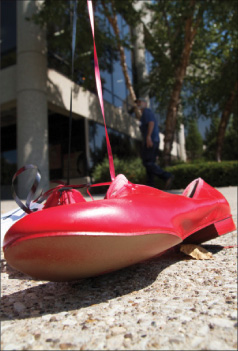Recently, students may have noticed red balloons and shoes on campus. The Campus Health Services Office of Health Promotion peppered the Belknap Campus with these shoes, advertising for free HIV testing. Sept. 22 marked the second consecutive week of free testing.
“CHS and Health Promotion have a broad definition of health,” said Kevin Goins, a sophomore biology and French double major who works for Campus Health Services. “It’s not just about cold and flu season.”
The free HIV testing offered by CHS is included in that definition.
“All the systems in the body work together,” said Goins. “If one is damaged, the rest are vulnerable. It’s important to your overall health to know your [sexually transmitted infection] status.”
According to the Guttmacher Institute, an organization dedicated to the advancement of worldwide sexual and reproductive health, “Roughly 56,000 new HIV infections occur each year, [and] an estimated 1 – 1.2 million individuals in the United States are living with HIV.”
Students present at the testing appreciated the opportunity to get tested.
“It’s pretty cool that they offer this kind of thing,” said a student who wished to remain anonymous. “It’s nice to know that there are ways to protect myself and get tested if I need to.”
Campus Health suggests the use of barrier methods of contraception for STI protection. In the National Health Assessment of the University of Louisville, only 54.5 percent of sexually active students were found to use any form of contraception during sexual intercourse. Of all students who had been sexually active within the past 12 months, 2.6 percent experienced unintentional pregnancy as a result.
According to Kathleen Conte, associate director of health promotion, obtaining contraception shouldn’t be a problem for U of L students.
“All students can get free condoms and lubrication at the student health building,” said Conte. “They don’t have to talk to anyone – just come in and stuff your pockets.”
CHS suggests that students know the STI status of their partners. In the National Health Assessment findings, 8.4 percent of U of L students admitted to having had four or more sexual partners in the past 12 months. The higher the number of partners a student has, the higher his or her risk of contracting an STI.
“Talk to your partner about your sexual health history,” said Conte. “Most STIs, including HIV, don’t have immediate symptoms. So someone may be infected and not even realize it.”
It is also recommended that sexually active students know their own status.
“Getting tested for something like that is kind of a taboo,” said Goins. “But there is really nothing wrong with knowing your status. There shouldn’t be any shame in it.”
With free STI testing, Campus Health is attempting to ensure that students who want to know their status can learn it.
“Reception for HIV testing has been great,” said Conte. “We were able to test over 40 students in a 2 hour time on Sept. 14, even having to turn some away.”
Goins agreed that students were eager to be tested.
“There were actually people waiting in line,” said Goins. “It was pretty cool to see that all of those people cared enough to get tested.”
The Office of Health Promotion plans to offer free testing once or twice a month for the duration of the 2010-2011 school year.






